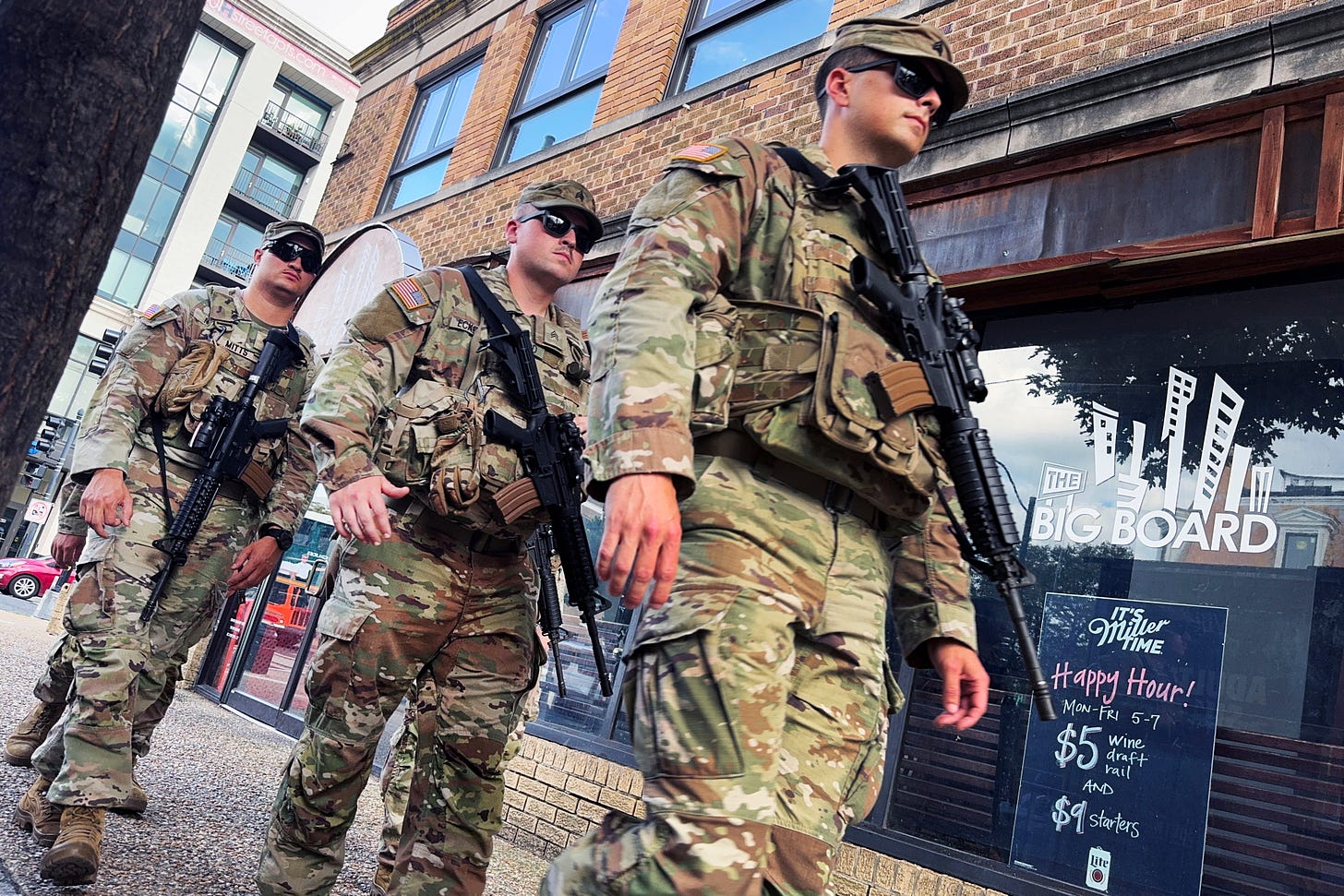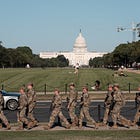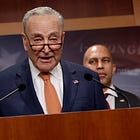Dems need to get serious about DC statehood. For real.
No more pussyfooting. With troops in the streets, the time is now.
A note from Aaron: ABC’s craven decision to pull Jimmy Kimmel’s show represents a major victory for MAGA in its war on free speech. In a climate where corporate media keeps obeying in advance and bending the knee to Trumpism, supporting independent media is more important than ever. If you value this newsletter — and I’m very proud of the quality explanatory journalism we do day in and day out — then please support our work by signing up for a paid subscription. Public Notice is made possible by readers like you.
Washington DC Mayor Muriel Bowser has spent months dancing gingerly around the White House, trying to balance two incompatible needs.
On one hand, her constituents despise President Trump (he lost the 2024 election in DC by an incredible 90-6 margin), so she doesn’t want to look like a weakling, knuckling under to him at every turn. On the other hand, she knows how vindictive he is, which means that if she doesn’t placate him he could use his power to do even more damage to the city than he already has.
So when Trump had to relinquish control of DC’s police after his invasion of the city reached the 30-day limit provided for in the law, Bowser might have thought the worst was over. No such luck: After she said the Metropolitan Police Department would go back to addressing crime and leave immigration enforcement to federal agencies, Trump had a social media tantrum on Monday, saying he “WON’T ALLOW THIS TO HAPPEN. I’ll call a National Emergency, and Federalize, if necessary!!!"
The reason Bowser and the 700,000 people she represents are in this situation is that the District of Columbia is not a state. She could try to stand up to Trump in the way governors including JB Pritzker and Wes Moore have done, but she won’t, because Trump has too many levers of power he can use to take revenge on DC.
So why aren’t Democrats using this opportunity to revive the effort to make DC a state?
We’re not asking about what they’ve done before — namely, brief and half-hearted support for the idea that wasn’t backed up by action. We’re talking about a genuine push for statehood. This overwhelmingly Democratic city was just assaulted and humiliated, its mayor reduced to groveling before the president in a sad attempt to minimize the harm done to its citizens. Meanwhile, Republican states across the country are engaged in an unprecedented wave of hyper-partisan gerrymandering explicitly intended to ensure that elections for the House of Representatives will be over before they begin.
If there was ever a time to put DC statehood back on the agenda, this is it.
How we got here
The Constitution gave Congress the power to create a “District (not exceeding ten Miles square) as may, by Cession of particular States, and the Acceptance of Congress, become the Seat of the Government of the United States.” Once Maryland and Virginia ceded some of their territory, DC as we know it came into being; the federal government officially moved there from Philadelphia in 1800.
District residents would have almost no political representation, but at the time, there were only 14,000 people living there, so the fact of their disenfranchisement may have presented less of an affront to democracy than it does today. Over time, partial rights were granted: In 1961, the 23rd Amendment allowed DC residents to cast ballots for president, and in 1973, Congress passed the Home Rule Act allowing DC to have an elected mayor and city council.
But the rights of DC residents remain constrained. They have only a non-voting representative in the House and no representation at all in the Senate. Laws passed by the city council can be overridden by Congress. The mayor does not command the DC National Guard, unlike every governor in the country. And federal law is full of ways the government can encroach on the district’s authority, as Trump just did by seizing control of the MPD.
You can explain why, as a historical and political matter, the 700,000 Americans who live in DC have fewer rights than those who live across the border in Maryland or Virginia, or in any other state for that matter. But you can’t defend it — at least not if democracy matters to you at all.
Here’s one way to think about it: Imagine if Democrats in Congress all got together and introduced a bill to declare Wyoming a Federal Natural Resource District. It would be managed by the government in Washington and would no longer have congressional representation, control of its National Guard, or the ability to make laws that were not subject to congressional veto.
Republicans would of course be appalled, and not just because they would lose two Senate seats. They would consider disenfranchising the 600,000 people who live in Wyoming to be profoundly immoral. Their media would be filled with Wyomingites saying “How dare you take away my rights! I’m an American!” And they’d be right.
Yet for pretty much ever, conservatives in Congress have acted as though DC residents need to earn their political rights, something they supposedly have not yet done. But consider this question: If the District were populated by white Republicans, would it have been granted statehood by now? We all know the answer.
Democrats need to rethink this issue
Had you asked any elected Democrat what their position is on DC statehood at any time in the last few years, the answer would have been, “DC statehood? Sure, I’m for that.” But if you followed up by asking When? or What are you planning to do about it?, the answer would have been “Um … well … eventually, it should happen, and I’ll be happy to vote for it when it does.”
But they haven’t actually done anything about it. The most statehood advocates have gotten from the leaders of the party is symbolic gestures.
For instance, in 2013, Barack Obama replaced the license plates on the presidential limousine with the “Taxation Without Representation” DC plates, an action the White House said “demonstrates the President’s commitment to the principle of full representation for the people of the District of Columbia.” The “commitment,” however, didn’t extend far past the license plates.
“The politics of it end up being difficult to get it through Congress, but I think it's absolutely the right thing to do,” Obama said at a town hall the next year. After Donald Trump took office he had those license plates removed from the limousine, and Joe Biden put them back.
Like every other Democrat running for president in 2020, Biden endorsed statehood during the campaign. But he too did little to make it happen, other than endorsing a statehood bill that passed the House in 2021 but predictably died in the Senate.
Elected Democrats no doubt believe that statehood doesn’t poll too well; voters aren’t bringing it up unprompted as a top priority. That demonstrates the problem with how Democrats approach their own priorities. One of the reasons they always default to “kitchen-table issues” is that they’re terrified of marginally-informed voters who, when asked what they care about, say “the cost of living” because it doesn’t require them to think too hard. Then the Democratic consultants tell candidates not to bring up anything else, since they’re only concerned about what might move the needle a point or two in the next election.
It’s true that advocating for statehood won’t help Democrats win the next election. But there are many important things for a party to do that won’t help them win the next election.
One of the few accurate compliments Trump’s supporters give him is their praise of the fact that unlike others in politics, he is willing to question what has been taken for granted and take actions others are too timid to entertain. In this case (and in more than a few others) it’s something Democrats should emulate. What exactly is keeping them from getting more serious on statehood? The answer is a bunch of lame cop-outs: The voters don’t care enough about it. There are more pressing things to fight about. It’s in the Constitution, so whaddya gonna do?
DC statehood is eminently doable
DC Delegate Eleanor Holmes Norton introduces a bill in every Congress that would retain the federal district the Constitution established by shrinking the district to a small area around the National Mall where Congress, the White House, the Supreme Court, the monuments, and some other important federal buildings are located. The rest of what is now DC, where most of its people live, would become the State of Washington, Douglass Commonwealth (named for Frederick Douglass, about whom Trump famously said is “somebody who’s done an amazing job and is being recognized more and more, I notice”).
Contrary to what some might assume, creating a new state doesn’t require anything more than an act of Congress signed by the president. We used to do it all the time; the last states admitted were Alaska and Hawaii, both in 1959. Most important, the decisions on when states would be admitted and what the borders would be were always political, with the parties deeply concerned about which of them would benefit from the new admissions.
Given the GOP’s attacks on voting rights, fair representation, and federalism, appearing too political — especially by trying to expand the number of Americans with full rights — is the last thing Democrats should worry about.
And yes, right now it’s not something a lot of voters outside DC care about a great deal. The answer to that problem is to make them care. That’s how elite agenda-setting works: When those with status and influence start talking about an issue or a goal, news organizations report on it, other people on their side start talking about it, the conversation grows wider and deeper, and before long it’s on the agenda and people do care about it.
Republicans do this all the time. When there’s something they want to accomplish and they think will be to their political advantage, they force it on to the national agenda even if they have to start from scratch. A few years ago, nobody cared if a trans kid 200 miles away from where they lived wanted to play on her middle school softball team, but now millions of Americans consider it a pressing national issue that should determine their votes. That didn’t happen organically; it was the result of a well-planned, elite-driven propaganda campaign.
If Democrats want to make voters care about DC statehood, their elected officials have to start acting like they care about it. They have to talk about it — a lot — and if they’re running for president they have to not just endorse it but promise to push for it, hard. They should pledge that in their first year in the White House there will be a statehood measure voted on in Congress. They should demand that a statehood bill be exempt from the filibuster. And if the bill fails that year, they should keep advocating for it, and bring it back again and again until it succeeds. Eventually, the campaign for statehood could become not a third-tier issue but something that defines what it means to be a Democrat.
It might take time to achieve — years, or even decades. But when you care about a political goal, you invest in it. If you have any courage and commitment, that is — and if you want to show voters you’re not a simpering pushover, too afraid of your own ideals to advocate for them with conviction.
That’s it for today
We’ll be back with more tomorrow. If you appreciate this edition, please do your part to keep Public Notice free by signing up for a paid subscription.
Thanks for reading.







Thank you for this clear-eyed piece.
Realism matters…especially now, when symbolic resistance isn’t enough.
I’ve been writing about how speech is shaped by power and how institutions quietly capitulate under pressure.
We need to name what’s happening and act before silence becomes complicity.
— Johan
Professor of Behavioral Science
Thank you for a clear argument. You're suggesting the Dems need pro-active, long-term strategies. I agree, but fear with current leadership this is a pipe dream.